7 Books I Read More Than Once
Books that changed my life and will definitely work their magic on you

Books that changed my life and will definitely work their magic on you
We are here on this earth for a limited time. Naturally, we want to make the most of our stay.
When it comes to reading books, so many people are focussed on reading as many books by different authors as possible. I am no different. I read eBooks while having food, listen to audiobooks while doing chores around the house, and read for at least 30 minutes before going to bed at night.
But then, there are some books so profound, I can’t help myself from reading them over and over again. Sometimes, it’s because of the insightful lessons they taught. At others, it’s because of how they made me feel. My heart chases those emotions like a thirsty traveler on a sunny day craves for water.
In this post, I’ve put together seven such books I’ve read more than once. These books span several genres — memoir, fiction, non-fiction, even fantasy. Each of them leaves a different flavor, and each of them is memorable in its own way. Read on. Who knows, you might find your next favorite read on this list.
(Note: The links mentioned in this article are affiliate links. If you choose to purchase these books through these links, it will help me earn a small amount — at no extra cost to you. Thanks!)
7. Sapiens by Yuval Noah Harari
Genre: Non-fiction
Why read it: It will teach you to apply logical reasoning in whatever issue you face and give you a better understanding of where we as a species came from.
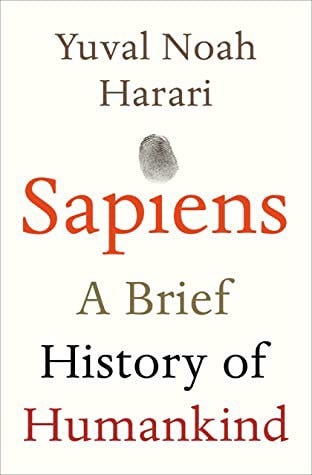
This is a brilliant, well-researched book tracing the history of humankind from our foraging ancestors to the current generation of humans who build supercomputers and smart cities. The author does a brilliant job of dissecting our origins and analyzing why we behave the way we do. There are clear ties and links to show how seemingly “millennial” problems like craving for sugary food or being unable to be faithful to your partner aren’t, in truth, new at all. Ancient homo sapiens have been facing the same problems and our reaction to them is imprinted in our DNA.
This book taught me that every human behavior we are familiar with today has its roots in the fight-or-flight response of our ancestors. Even the concept of happiness can be tackled with cold logic. If you break it down to merely the interplay of chemicals in your brain, you will stop holding so much value to it.
“Happiness does not really depend on objective conditions of either wealth, health or even community. Rather, it depends on the correlation between objective conditions and subjective expectations.”
Why I read it more than once
Nearly every behavioral trait of every person around you can be traced back to their origins. All you need is a little bit of logic and you can read into the behavior of a person like an expert.
The next time you’re arguing with someone and feel an insatiable need to prove yourself right, understand that this comes from the innate need to fight and prove yourself the “Alpha” of the pack. The moment you realize that the other person probably wants the same and that’s why they are arguing so hard, you may no longer feel compelled to continue. Thus, you will save precious time you can now use to pursue your goals.
When you feel anxious or stressed, understand that this is just a response of your body and it’s telling you you’ve probably bitten off more than you can chew.
Once you let go of emotions and look at every scenario with cold logic, you will be surprised at how simple it becomes to deal with problematic situations.
The key is to detach emotion and examine the problem objectively.
6. The Bell Jar by Sylvia Plath
Genre: Semi-autobiographical fiction
Why read it: Get inside the mind of a person suffering from depression and understand that mental health issues are just as harmful as the injuries or diseases of the body.
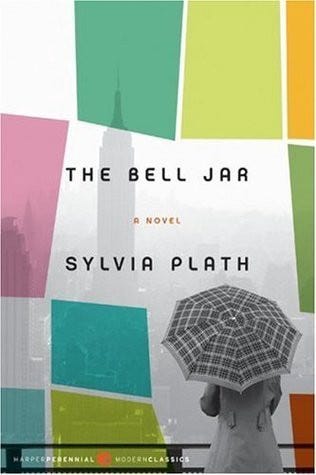
The Bell Jar chronicles the crack-up of Esther Greenwood: brilliant, beautiful, enormously talented, and successful, but slowly going under — maybe for the last time.
Plath’s writing is raw and honest. Her heroine, the talented, ambitious Esther leaves her mark in the reader’s mind. She is young and full of dreams but never seems to fit in at any place, with any person.
Esther feels she is trapped inside a bell jar — a place that distorts her world-view and traps her inside, isolating her from everyone around her. Plath’s words are an accurate depiction of clinical depression — how a person who is depressed never really feels “sad”, but more of “empty”, like a shell.
“To the person in the bell jar, blank and stopped as a dead baby, the world itself is a bad dream. Because wherever I sat — on the deck of a ship or at a street café in Paris or Bangkok — I would be sitting under the same glass bell jar, stewing in my own sour air.”
Why I read it more than once
I found myself in the words of Sylvia Plath. This novel is relatable. It is heartbreaking. It is beautiful. It is truly a masterpiece.
More than anything, it is a story of how, contrary to popular beliefs, having depression does not mean a person is weak-willed. Depression is a mental illness, and like all other illnesses of the human body, proper medication and treatment can cure it.
Read this book if you have ever felt like you are alone and no one understands you. Read this if you have ever felt empty in spite of your successes. Read this if you have struggled with insomnia and felt too afraid to share it with a friend.
But most importantly, read this because it has one of the best, most unabashed displays of raw honesty in fiction. No lover of literature should miss out on the treat that is Sylvia Plath’s writing.
5. Wolfsong by T. J. Klune
Genre: Shifter fantasy
Why read it: Absolute heart-warming read. The kind of book that will make you believe in love again.
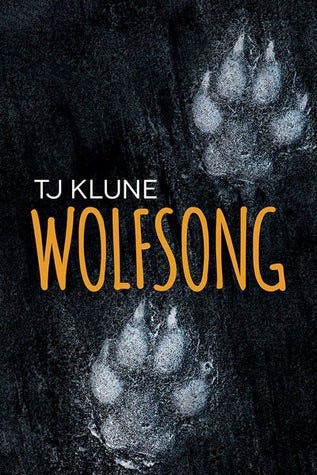
Fifteen-year-old Ox Mattheson had an abusive father who damaged young Ox’s sense of self-esteem and instilled in him the feeling that no matter where he goes and what he achieves, he will never be enough. It’s a burden Ox believes he would have to carry on his shoulders all his life.
And then, he meets Joe Bennett, and his life changes forever. What Ox didn’t know was that Joe Bennet is a werewolf, destined to be the future Alpha and lead the Bennett pack — the most powerful family of werewolves in the whole of North America.
The Bennetts bring color into Ox’s life, and they paint the book in shades of orange, violet, blue, and green, green, green.
“You don’t get to decide what you’re worth because you obviously don’t know. You don’t get to decide that anymore because you have no f*cking idea that you’re worth everything.”
Why I read it more than once
I wrote a post saying this was the best fiction book I read in 2020 and I stand by the statement. Even if this isn’t pure fantasy fiction, I read this book more than once for the heartwarming story it tells.
I read it for the family and pack values the Bennetts inspire, for how willing they are to sacrifice their lives, so their loved ones remain safe, and how they think of nothing else but family, love, brother, pack when they face danger.
I read it for the edge-of-the-seat excitement of the battle scenes — all the blood and gore and the immense strength of will each character shows.
But most of all, I read this book for Ox and Joe. I read it for the pure, unadulterated love they share and how their bond grows and evolves as they age.
4. Surely You’re Joking, Mr. Feynman by Richard Feynman
Genre: Memoir
Why read it: The funniest prose combined with the most inspirational narrative, this is a book that will stay with you long after the last page is turned.
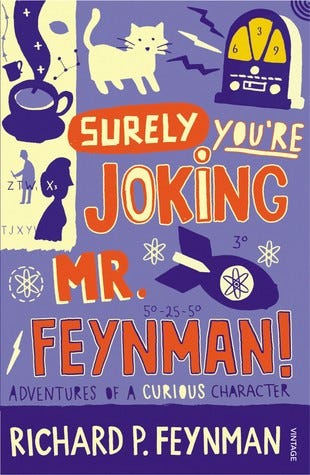
In the book, Feynman talks about his adventures as a child where he taught himself to repair radios, and when he goes to college and beyond. The most fascinating trait I found in Feynman was his ever-burning curiosity to learn new things and acquire new skills.
For someone with his level of accomplishments, this brilliant man never stopped trying to upgrade his skillset and ask questions whenever he had the smallest of doubts.
Would you believe this scientist who helped create the atomic bomb was also a master safecracker and a skilled player of the frigideira — a Brazilian percussion instrument?
“I would rather have questions that can’t be answered than answers that can’t be questioned.”
Why I read it more than once
The biggest lesson I learned from this book was how to make curiosity a part of your life. Whenever you come across a theory in a book or proposed by an elder, ask yourself why that’s possible. Asking questions will help you understand the core concepts better and gain more in-depth knowledge of the subject at hand.
However, even after you uncover the answers, understand that nature is constantly evolving. It is inevitable that your knowledge will be obsolete soon. Be open to conflicting opinions and do not shut down someone who speaks something contrary to your beliefs. An this is why I read this book twice cover-to-cover and several bits and pieces countless times over the years.
3. The God of Small Things by Arundhati Roy
Genre: Domestic Fiction
Why read it: The rare novel that makes you feel as if the author has poured their lifeblood into it, and that there will be nothing left for them to write once this book is done.
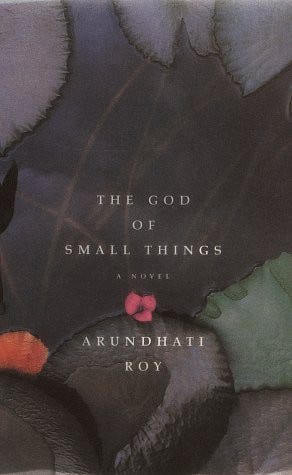
An idyllic village where nothing really happens. A divorcee still blamed by her family as if whatever happened to her was her fault. A boy-girl pair of dizygotic twins who have shared their entire lives while growing up and are fated to share much more than anything they could have imagined. A secret relationship that’s forbidden by the rules of society that dictate whom to love and how. And how much.
Roy’s debut novel that went on to win the Man Booker Prize in 1997 is a must-read for any lover of literature.
“Perhaps it’s true that things can change in a day. That a few dozen hours can affect the outcome of whole lifetimes. And that when they do, those few dozen hours, like the salvaged remains of a burned house — the charred clock, the singed photograph, the scorched furniture — must be resurrected from the ruins and examined. Preserved. Accounted for. Little events, ordinary things, smashed and reconstituted. Imbued with new meaning. Suddenly they become the bleached bones of a story.”
Why I read it more than once
The characters are so well-crafted and the writing is so beautiful, it will almost feel as if Roy has disguised poetry as prose. You can read it like a social commentary on the caste-based discrimination prevalent in India, or you can read it like a heartfelt love story.
Either way, this is going to end up as one of the best books you have ever read.
2. The Hitchhiker’s Guide to the Galaxy by Douglas Adams
Genre: Science-fiction/Comedy
Why read it: The best treatise on existential crisis wrapped under layers of science fiction and humor.
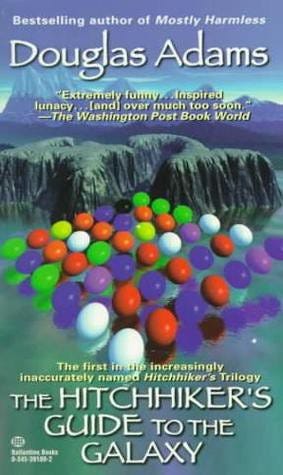
A man from London and his best friend become homeless when the earth is destroyed by a bunch of aliens to make space to make way for a hyperspace bypass. This short, hilarious book will take you through a journey across the universe with the most delightful ensemble of characters you will ever have the privilege to meet.
But, apart from its stellar plot, what really makes the book stand out is how accurately the author depicts the feeling of homelessness, of never really belonging anywhere — a problem so many people of our generation are assailed with.
“Every single decision we make, every breath we draw, opens some doors and closes many others. Most of them we don’t notice. Some we do.”
Why I read it more than once
I was fourteen when I first read this series. I thought the absurdist comedy in these books were funny. The teenage reader in me didn’t catch on the symbolism and the parallels to the human world at all.
But rereading this series as an adult made Adams’ writing have SO much more sense. Yes, the books are hilarious, but they delve deep into the human psyche, into the dichotomy of our choices, into how no matter however much we achieve, nothing seems to be enough.
This is philosophy disguised as comedy.
1. The Harry Potter Series by JK Rowling
Genre: Young adult fantasy fiction
Why read it: Well, there isn’t really any reason you should read it now because there are so many fantasy books better than Harry Potter. But if you must, read it for the overpowering message of victory of good over evil.
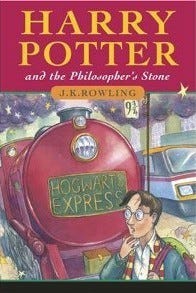
I first read Harry Potter when I was eleven. It was spell-binding. It had me hooked for seven glorious hours. Together, Harry, Ron, and Hermione gave me some of the most memorable moments in literature, some of which are still crystal clear in my head, 16 years after I first read Harry Potter and the Philosopher’s Stone.
Why I read it more than once
Recently, I decided to re-read the books again.
For the eighth time.
(Yes, I know seven is the most magical number and I wanted to keep it at that, but the temptation of reliving those magical moments was too great to stick to some silly resolution).
I am 28 now, but I was still gushing over how captivating the stories were.
I had tears in my eyes every time Snape bullied Neville, I was whopping the air with excitement when Hermione slapped Malfoy, I had to suppress giggles when Ron decided to declare his love for Romilda Vane, I was crying with Fawkes on the sight of Dumbledore’s broken body below the Astronomy tower, and just like the old times, each Quidditch match made my heart pump harder with the adrenaline rush.
Just like the old times, a familiar warmth embraced my heart and clutched it tighter.
Yes, I still love Harry Potter.
Isn’t there an appropriate age for reading it, you ask?
Well, after a child reaches, say, their seventh or eighth birthday, I would say it is appropriate for everyone.
After all, was magic ever bound by the boundaries of age?


For more book reviews, follow me on Goodreads.
